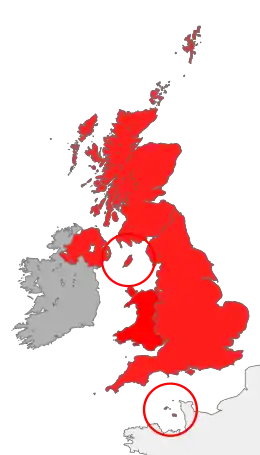British Islands
The British Islands is a term within the law of the United Kingdom which since 1889 has referred collectively to the following four polities:
- the United Kingdom of Great Britain and Northern Ireland (formerly the United Kingdom of Great Britain and Ireland);
- the Bailiwick of Guernsey (including the jurisdictions of Alderney, Guernsey and Sark); and
- the Bailiwick of Jersey;
- the Isle of Man.
 A map showing the areas referred to as the British Islands shaded red. | |
| Geography | |
| Location | North-western Europe |
| Coordinates | 54°N 4°W |
| Adjacent bodies of water | Atlantic Ocean, North Sea |
| Total islands | 6,000+ |
| Highest elevation | 1,345 m (4413 ft) |
| Highest point | Ben Nevis[5] |
| Administration | |
| Capital and largest settlement | Saint Peter Port |
| Area covered | 78 km2 (30 sq mi) |
| Capital and largest settlement | Saint Helier |
| Area covered | 118 km2 (46 sq mi) |
| Capital and largest settlement | Douglas |
| Area covered | 572 km2 (221 sq mi) |
| Capital and largest city | London |
| Area covered | 244,111 km2 (94,252 sq mi) |
| Demographics | |
| Languages | Auregnais, Cornish, English, French, Guernésiais, Irish, Jèrriais, Manx, Scots, Scottish Gaelic, Sercquiais, Shelta, Ulster-Scots, Welsh |
| Additional information | |
| Time zone | |
| • Summer (DST) |
|
| Drives on the | left |
The Isle of Man and the Bailiwicks of Guernsey and Jersey are Crown dependencies and are not a part of the United Kingdom. The Parliament of the United Kingdom on occasions introduces legislation that is extended to the islands, normally by the use of Orders in Council. For this reason it has been found useful to have a collective term for the combined territories. Dating back to 1889, a statutory definition can be found in Schedule 1 of the Interpretation Act 1978.[6]
The term The United Kingdom and the Islands is used in the Immigration Act 1971.[7][8]
Passports
British passports issued in the UK have the wording "British Passport - United Kingdom of Great Britain and Northern Ireland" on their cover. In the Crown dependencies, this is replaced by "British Passport – Bailiwick of Jersey", "British Passport – Bailiwick of Guernsey" or "British Passport – Isle of Man". Before the UK left the European Union, they used to say "British Islands". These passports are issued to all British citizens resident in the jurisdiction in question.[9]
Legal basis
Section 5 of the Interpretation Act 1978 provides that "in any Act, unless the contrary intention appears" the expression "British Islands" is to be construed according to Schedule 1 of that Act, which contains the following paragraph:
"British Islands" means the United Kingdom, the Channel Islands and the Isle of Man.[6]
Subject to paragraph 4(2) of Schedule 2, that paragraph of Schedule 1 applies, so far as applicable, to Acts passed after the year 1889.[10]
Paragraph 4(2) provides:
The definition of "British Islands", in its application to Acts passed after the establishment of the Irish Free State but before the commencement of this Act, includes the Republic of Ireland.[10]
Irish Free State
The Irish Free State was established on 6 December 1922 and the Interpretation Act 1978 came into force on 1 January 1979. With effect from the Ireland Act 1949, British law recognised that the Republic of Ireland had ceased to be a Dominion and/or member of the Commonwealth of Nations but that it would not be treated as a foreign country for the purposes of British law.
See also
References
- "the British Isles". téarma.ie – Dictionary of Irish Terms. Foras na Gaeilge and Dublin City University. Retrieved 18 November 2016.
the British Isles s pl (Tíreolaíocht · Geography; Polaitíocht · Politics; Stair · History; Logainmneacha » Ceantar/Réigiún · Placenames » Area/Region) Na hOileáin bhriontanacha
- University of Glasgow Department of Celtic
- Office of The President of Tynwald (PDF), archived from the original (PDF) on 24 February 2009
- "Règlement (1953) (Amendement) Sur l'importation et l'exportation d'animaux". States of Jersey. Archived from the original on 29 January 2016. Retrieved 2 February 2012.
- "Great Britain's tallest mountain is taller - Ordnance Survey Blog". Ordnance Survey Blog. 18 March 2016. Retrieved 9 September 2018.
- "Interpretation Act 1978 SCHEDULE 1". legislation.gov.uk. Government of the United Kingdom. Retrieved 24 October 2019.
- "britishcitizen.info" (PDF). britishcitizen.info. Archived from the original (PDF) on 1 September 2009. Retrieved 3 September 2013.
- "Immigration Act 1971". Legislation.gov.uk. Retrieved 3 September 2013.
- "States of Guernsey passports". Guernsey Government Website. Archived from the original on 20 November 2008. Retrieved 6 February 2009.
- "Interpretation Act 1978 SCHEDULE 2". legislation.gov.uk. Government of the United Kingdom. Retrieved 24 October 2019.
External links
- Text of the British Islands as in force today (including any amendments) within the United Kingdom, from legislation.gov.uk.
- Interpretation Act, 1978 (unofficial text)